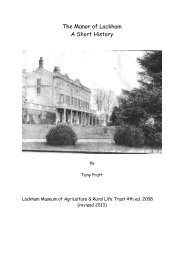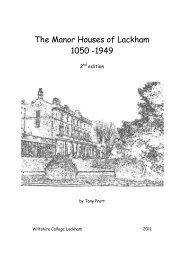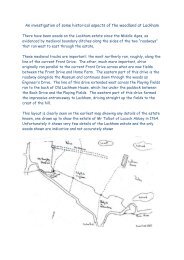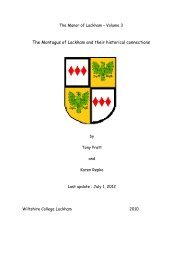History of Agricultural Education in Wiltshire - Lackham Countryside ...
History of Agricultural Education in Wiltshire - Lackham Countryside ...
History of Agricultural Education in Wiltshire - Lackham Countryside ...
You also want an ePaper? Increase the reach of your titles
YUMPU automatically turns print PDFs into web optimized ePapers that Google loves.
When World War II ended, and follow<strong>in</strong>g the Butler <strong>Education</strong> Act <strong>of</strong> 1944<br />
which recognised <strong>Agricultural</strong> <strong>Education</strong> as a branch <strong>of</strong> Further <strong>Education</strong>,<br />
exchequer grants were <strong>in</strong>creased to provide more Research Stations and Farm<br />
Institutes.<br />
Dur<strong>in</strong>g this period, 1945-1970, a technological revolution was tak<strong>in</strong>g place <strong>in</strong> <strong>in</strong><br />
British Agriculture and-Horticulture. New techniques <strong>in</strong> Crop and animal<br />
husbandry, mechanisation and labour sav<strong>in</strong>g devices, together with work studies<br />
and improved bus<strong>in</strong>ess and market<strong>in</strong>g methods, all contributed towards a decl<strong>in</strong>e<br />
<strong>in</strong> the number <strong>of</strong> full-time farm workers and new entrants to the <strong>in</strong>dustry.<br />
In 1964, the number <strong>of</strong> regular full-time male farm workers between the ages<br />
<strong>of</strong> 20 and 64 was 250,000, which decl<strong>in</strong>ed by 60,000 <strong>in</strong> 1970. The old<br />
craftsmen, such as thatchers, stack builders, carters, hedgers, handmilkers<br />
etc. were no longer needed and there was a new demand for well-educated<br />
and skilled tra<strong>in</strong>ed workers by farmers to handle the sophisticated and<br />
expensive mach<strong>in</strong>ery, and technicians to supervise the work <strong>of</strong> various<br />
departments on the larger farms and estates.<br />
By 1965, the number <strong>of</strong> <strong>Agricultural</strong> students attend<strong>in</strong>g Universities and Colleges<br />
doubled the pre-war figure and there were 37 Farm Institutes with a record<br />
number <strong>of</strong> 2900 full-time and 8000 part-time students (all ages).<br />
It is <strong>in</strong>terest<strong>in</strong>g to f<strong>in</strong>d that although the number <strong>of</strong> new entrants decl<strong>in</strong>ed,<br />
there was a steady <strong>in</strong>crease <strong>in</strong> the number receiv<strong>in</strong>g full-time and part-time<br />
education and tra<strong>in</strong><strong>in</strong>g. On the farms, the productivity was also <strong>in</strong>creas<strong>in</strong>g by<br />
double the national average <strong>in</strong> <strong>in</strong>dustry.<br />
Farmers were pay<strong>in</strong>g good wages to skilled and well-tra<strong>in</strong>ed men and a new wages<br />
structure, based on Pr<strong>of</strong>iciency Tests by the newly formed <strong>Agricultural</strong> Tra<strong>in</strong><strong>in</strong>g<br />
Board, was an added <strong>in</strong>centive for skilled farm workers and apprentices. By 1975,<br />
it is estimated that approximately half <strong>of</strong> those employed full-time <strong>in</strong> the<br />
<strong>in</strong>dustry will have received some from <strong>of</strong> <strong>Agricultural</strong> education and tra<strong>in</strong><strong>in</strong>g.<br />
Between 1943 and 1970, the development <strong>of</strong> <strong>Agricultural</strong> <strong>Education</strong> was<br />
considered by <strong>in</strong>dependent Committees and a series <strong>of</strong> reports were issued from<br />
time to time by the M<strong>in</strong>istries <strong>of</strong> <strong>Education</strong> and Agriculture <strong>of</strong>fer<strong>in</strong>g advice,<br />
guidance and recommendations to those Local Authorities <strong>in</strong>terested <strong>in</strong> the<br />
subject. These reports were far reach<strong>in</strong>g and helpful and will be discussed <strong>in</strong><br />
some detail <strong>in</strong> Chapter II, which deals with the <strong>History</strong> <strong>of</strong> <strong>Agricultural</strong> <strong>Education</strong><br />
<strong>in</strong> <strong>Wiltshire</strong>.














